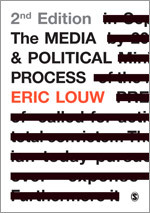
För ett tag sedan läste jag The Media and Political Process av Eric Louw, och förutom att vara en bra bok om politisk kommunikation, bjöd den också på följande guldkorn till citat – som handlar om relationen mellan journalister och politiker.
Vad politiker måste göra i en medialiserad politik (sidan 25ff):
Secondly, the televisualization of politics altered the sort of people selected to be performance-politicians […] What is now required is an ability to wear whatever ’face’ (mask) one’s minders require: to perform in front of television camers; to look attractive and/or ’leader-like’ on screen; to speak in sound-bites; and preferably say nothing substantive when journalists are around.
Vad politiska journalister tror om sig själva (sidan 71):
Central to liberal journalism’s professional ideology is the notion that journalists serve the public by acting as watchdogs. […] this notion has grown into a package of fantasies political journalists now believe about themselves, i.e. […] A self-image of themselves as tough, rugged individuals fighting for truth and justice […] These fantasies generate a sense of being an elite group among political journalists.
Journalisternas makt (sidan 73ff):
It is also a ’negative power’, because journalists do not have the power to make policy or allocate resources, but they can (in certain circumstances) undermine those with such power. Hence, journalists have (sometimes) the power to frighten politicians and to mobilize ’moral panics’ and ’groundswells of hostility’ to policies.
Kort sagt har journalister vanföreställningen att de tillhör den politiska eliten men kan egentligen bara skrämma politiker och framkalla moralpanik bland allmänheten. Politiker å andra sidan gör bäst i att inte säga något av substans, över huvud taget, i närheten av en journalist, och ska helst bara vara en bildskön snubbe som ser ut som en ledare i tv-rutan. 😀